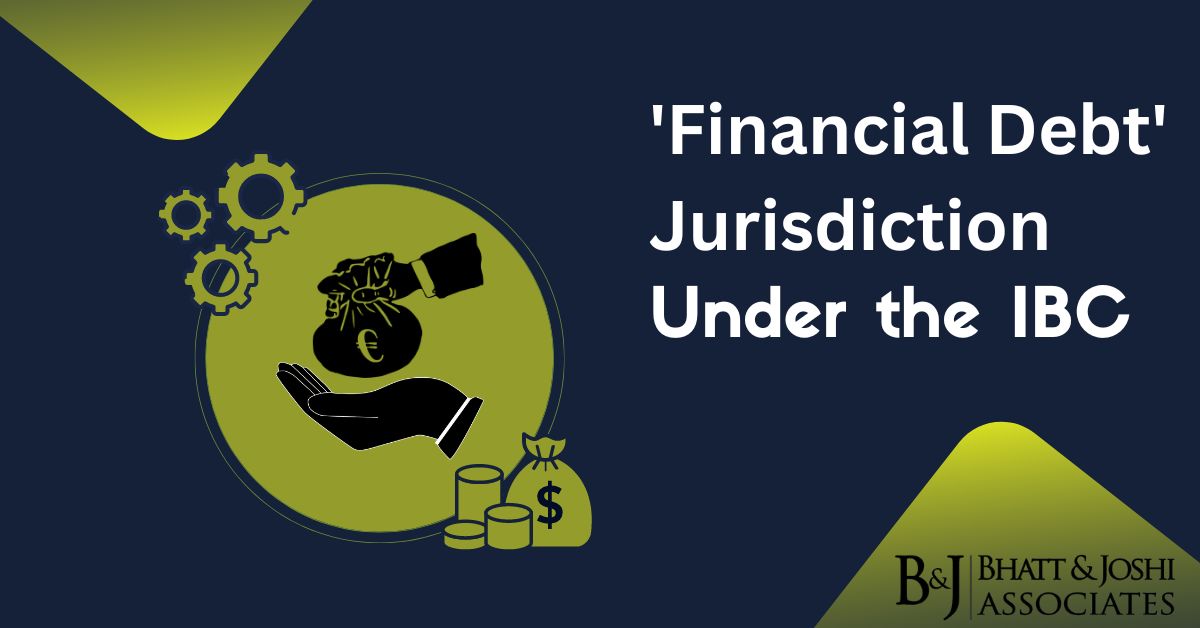Introduction
In accordance with the Insolvency and Bankruptcy Code (IBC), the definition of “financial debt” has been subjected to a comprehensive review by the judicial system. As a result, courts and tribunals have provided in-depth insights into the many types of financial transactions. During a recent case, the National Company Law Appellate Tribunal (NCLAT) discussed the question of whether or not an advance payment made in accordance with an oral agreement for the acquisition of shares is considered to be “financial debt” in accordance with the Insolvency and Bankruptcy Code (IBC) (citation: (2024) ibclaw.in 63 NCLAT).
A Comprehensive Understanding of the Concept of “Financial Debt”
The International Business Code (IBC) gives a thorough definition of the term “financial debt” in its section 5(8). This definition encompasses not only a debt but also any interest that is given in exchange for the worth of money over their lifetime. Section 5(7) states that the term “financial creditor” refers to any person or organisation that is owed a financial debt. This definition includes any people or entity. In spite of the fact that the definition is so broad, the judicial system continues to have the authority to determine what constitutes “financial debt.”
The Meaning of ‘Financial Debt’ in the International Business Code has been shaped by a number of significant precedents. It is significant that the Supreme Court has decided that loans that do not incur interest are included in the definition of the phrase “financial debt.” In addition to the fact that it is vital to place an emphasis on the understanding of the time value of money, transactions that indicate the economic impact of borrowing may also be characterised as “financial debt.”
The verdict of NCLAT:
It has been decided by the Supreme Court that loans that are not subject to interest and are given to a corporation in order to sustain its commercial operations are regarded to be “financial debt.” The IBC is guaranteed to include a wide variety of financial agreements as a result of this verdict, which shows the enormous range of the term. The National Company Law Tribunal (NCLAT) overturned a verdict by the National Company Law Tribunal (NCLT) and declared that a security deposit, which includes interest, given by a corporate debtor is regarded to be “financial debt.” When establishing the parameters of a financial transaction, it is essential to take into account the time value of money, as this highlights the relevance of this component.
Through the Corporate Insolvency Resolution Process (CIRP), the National Company Law Appellate Tribunal (NCLAT) has confirmed that when a corporate debtor gives a guarantee, the entity in question becomes a financial creditor. This pertains to a loan for a group entity. The understanding of financial transactions is expanded as a result of this, going beyond ordinary instances of borrowing. ‘Financial debt’ Collective Investment Schemes: The National Company Law Tribunal (NCLAT) issued an order to the National Company Law Tribunal (NCLT) to accept an insolvency application. The NCLAT emphasised that the consideration of the time value of money is the key characteristic of any loan that is referred to as ‘financial debt’. Within the context of determining the level of financial indebtedness, the verdict highlights the significance of the monetary transaction component.
A decision made by the NCLT that rejected an insolvency case was overturned by the NCLAT, which ruled that a deposit is constituted a “financial debt” according to the guidelines established by the IBC. As a form of compensation for the idea that time is worth more than money, the corporate debtor was expected to make interest payments on a consistent basis. Taking into consideration the position of the National Company Law Appellate Tribunal (NCLAT) with relation to verbal share purchase agreements: In a recent statement, the National Council of Legal Affairs (NCLAT) emphasised that the phrase “financial debt” encompasses a wide range of responsibilities, including those that involve interest payments paid in exchange for the value of money in terms of time. However, clause (f) of Section 5(8) includes any monies gained through transactions that operate as borrowing, notwithstanding the fact that sections (a) to (i) of the section do not particularly include oral purchase agreements.
The tribunal came to the conclusion that it is difficult to accept the notion that the transaction may be considered as the repayment of a “financial debt” because there is no evidence to support the existence of a share purchase agreement or any other pertinent elements regarding borrowing. An emphasis was placed by the NCLAT on the necessity of conducting an analysis of the characteristics of the contract, and concerns were made regarding the appropriateness of employing the IBC in order to enforce a contract that was related to the purchase of a specific property at the time of the transaction in December of 2014.
Conclusion: NCLAT’s Ruling on ‘Financial Debt’ under IBC
A contribution has been made to the growing set of legal principles concerning the interpretation of ‘financial debt’ in accordance with the IBC by the decision that was just handed down by the NCLAT. The significance of carefully scrutinising each transaction on its own, taking into account the underlying character of the financial agreement, and determining whether or not it is consistent with the idea of the time value of money is emphasised by this phrase. As a result of the fact that businesses engage in a variety of financial transactions, which in turn affects the way in which insolvency processes are carried out, the judicial system plays a vital role in refining and clarifying the ideas of debt in the financial sector.














